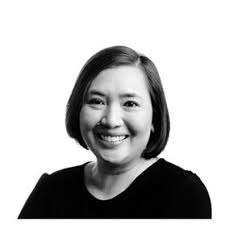In the #BCMTalks sessions, a series of talks that focus on
sharing women’s breast cancer experience with an online audience, Gia Sison
(@giasison) became the latest guest speaker. Gia shared her unique experience
of being a patient and physician of breast cancer. She began by taking
listeners back to the very beginning.
“I was diagnosed just over one year ago when, by
coincidence, I felt a lump in one of my breasts,” she explained. “I had a
mammography procedure done and I was able to understand the image of my
breasts. When I saw it I said to myself ‘this looks bad.’ As a physician I
already knew it was cancer.”
The shock didn’t end there as a mixture of feelings threatened
to overpower her. However Gia’s profession as a doctor meant she began
formulating a plan of action.
“I was totally numb at first. I wasn’t able to cry. I had to
pull myself together and work out how to manage it. I was debating with myself
as to the best course of treatment.”
She said that the bungee jump from doctor to patient was
profound. “I felt lonely at times, other times it was happiness. It was a
roller-coaster of emotions.”
The topic of connection and support is an often overlooked
aspect of breast cancer treatment. Patients are often left without a means of
support group alongside fellow cancer patients. However Gia, use the social
media vital in developing a support network and keeping her spirits positive
throughout her chemotherapy sessions.
“The social network knew my story first even before my
friends did,” she said. Through them I began to form support groups. They were
instrumental in my support system when I was diagnosed and undergoing
treatment.”
“Whenever I would go into chemotherapy, I would tweet. There
would be a surge of tweets cheering me on. Through their support I was able to
go to chemo. They put up a Facebook fan page and posted messages of hope, which
I read every day. They served as my support group and reinforced for me the
wonders of digital health.”
Gia shared the unique position she was placed in as a cancer
patient and physician. She explained how her bedside manner has changed and how
effective her experiences are in urging patients to keep positive.
“Whenever I see patients with cancer now there is an extra
dash of empathy because I have had that experience and can empathize. I
find myself sharing my own story with the patient as I don’t want them to lose
hope as their doctor had cancer too.”
Gia went onto portray a portion of the actions she took after
she was given the all-clear. “I started to become my conscious of the
ingredients in my food. I did cheat occasionally with junk food though!”
“I’ve also been exercising and becoming extra vigilant with
my health. I also try to get six hours of sleep.”
Gia's last words to the session's listeners were one of
positivity and courage in the face of adversity. “If there’s anything that
cancer taught me is
life happens for a
good reason and it’s really all about perspective,” she said. “You can
either see your disease as something to gripe about or as something that can
get you to change your lifestyle for the better.”
“You cannot handle cancer alone. A support group is very
important. It has taught me to connect and conquer cancer with courage in my
heart.”
She concluded with one critical recommendation – a
self-administered breast exam every month. “If I had examined my breasts
earlier I could have caught the mass and avoided chemotherapy,” she said. “I
regret not doing that. So that’s my advice: go for early detection and
screening and if you feel a lump go see your doctor.”



